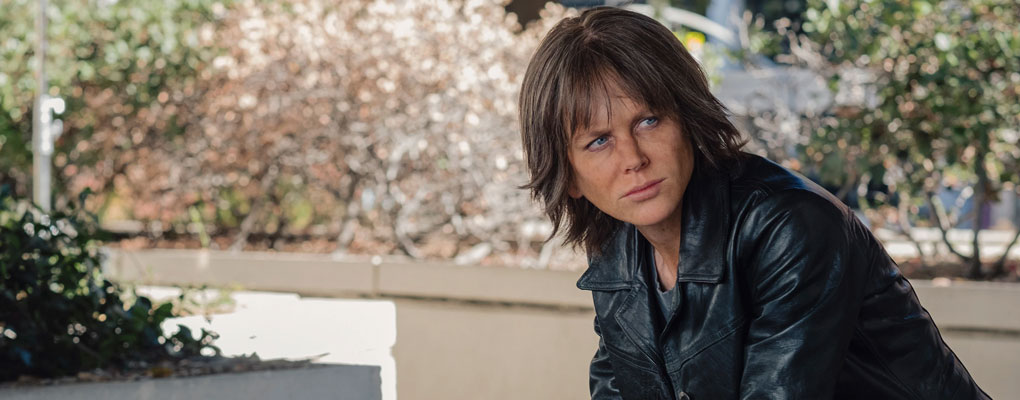Films
Destroyer review
Back in January of 2015, shortly after the 87th Oscar nominations were revealed, the hashtag #OscarsSoWhite began trending on social media. The reason behind it was that there was a real feeling in some quarters that the Academy Awards were woefully underrepresenting the cinematic work of people of colour.
Since then, the premier film awards have fallen over themselves to address the issue. Yet while Hollywood and its associated award givers carefully examine their shortcomings in terms of race, there’s still more to be done when it comes to encouraging and recognising women in the industry. Particularly behind the camera.
It may be unfair to throw adjectives like ‘sexist’ around, but the fact that in nine decades of Oscars history only one female director has won the Best Director award is quite telling. Especially when you consider that only five women have ever been nominated for the prize (that’s around 1%).
Why do we mention it? Well, not because we’ve any intention of starting up an #OscarsSoMale hashtag or anything. More because we’ve just watched Karyn Kusama’s incredibly arresting, hard-hitting and unforgettable new crime drama Destroyer and we can’t quite understand why Kusama didn’t make this year’s shortlist.
Is it a gender issue? Well, we’ll let others debate that. Those that do might like to mention the job Marielle Heller did on the Lee Israel biopic Can You Ever Forgive Me? And we’d certainly expect Lynne Ramsay’s immense work on You Were Never Really Here to come up in the conversation too.
Perhaps the Academy just didn’t quite see Destroyer for what it is. After all, Nicole Kidman’s jaw-dropping Golden Globe-nominated performance – arguably the best of her career – didn’t even get a nod from them. Which is just absurd from where we’re sitting.
So what is Destroyer exactly? Well, it’s about as perfect a crime film as you’re likely to ever see. In terms of plotlines and themes, it’s a movie that most of us will have seen before. Maybe even a few times. A growling, burnt-out and booze-loving detective with renegade tendencies, family problems and a scuffed leather jacket kicks down doors and rams the butt of a gun into bad guys’ heads until a final act of vengeance and penance cleanses their filthy soul.
Only this is no standard three star Mark Wahlberg or Denzil Washington shoot ’em’ up fare, though. The tropes are here, but there’s nothing clichéd happening here. For many reasons, but the primary one is the obvious one. The central character is a woman.
This isn’t a case of attention-seeking gender-swapping stunt casting, either. As the barely able to walk wreck of a police detective that Erin Bell is, Nicole Kidman gives a gruelling performance that you feel every second of. She’s (heavily) made up to appear older, sun-baked and beaten down (as well as up). In much the same way that Charlize Theron famously did for her Oscar-winning turn as Aileen Wuornos in Monster, back in 2003.
Det. Erin Bell is a whispering, sleep-deprived and traumatised LAPD detective who’s stubborn, unfriendly, unliked and ravaged by time, alcohol and an undercover sting operation from a decade and a half ago that went badly, badly wrong. She begins hunting down the former members of the bank-robbing gang that she and her partner Chris (played by Sebastian Stan) infiltrated, after the gang’s leader Silas (Toby Kebbell) comes out of retirement and begins taunting her. Erin’s investigation is strictly off the books, so there are no statements or arrests or any of that boring procedural business. Just a whole lot of unreported stakeouts, chases, fights and gun battles.
It isn’t just Kidman’s almost Clint Eastwood-like work here that stands this truly excellent cop thriller out from the crowd. Kasuma directs the action with a swagger, especially during the big bank robbery scene that’s faintly reminiscent of Michael Mann’s LA-set Heat. It’s testament to them both that a film can have Nicole Kidman kicking in a door and firing an assault rifle and it not seem odd.
The cinematography from Julie Kirkwood is applied here with an artistic flourish that Kirkwood calls ‘sunlight noir’ and it’s nothing short of beautiful. The orange panoramas bring to mind another classic Los Angeles crimer, this time William Friedkin’s dusky 80s masterpiece To Live and Die in LA. All while Theodore Shapiro’s brilliantly ominous and droning score adds a visceral layer of doom to a picture that ratchets the tension up to near-unbearable levels at times.
A sweaty, dusty and blood-stained LA noir, Destroyer is packed full of sleaze, grime and unpleasantness. Yet there’s real heart to this pulpy piece deep down, especially in the emotionally charged scenes between Erin and her teenage daughter Shelby (Jade Pettyjohn). This is a gripping and immersive tale of redemption and obsession, anchored by a wonderfully metamorphic central performance which really leaves an impact.
So it’s not had the love it deserves from the old fellas that hand out the statuettes… Destroyer is still easily one of the best crimes films of the past decade.
Have you seen Destroyer in your local cinema? Let us know your thoughts in the comments below if so…


Please note: Moderation is enabled and may delay your comment being posted. There is no need to resubmit your comment. By posting a comment you are agreeing to the website Terms of Use.